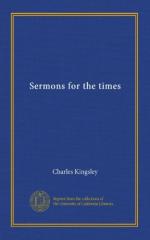What laws of God, now, can we learn from this story?
First, we may learn what a sacred thing property is. That a man’s possessions (if they be justly come by) belong to him, in the sight of God as well as in the sight of man, and that God will uphold and avenge the man’s right.
Naboth, you see, stands simply on his right to his own property. ’The Lord forbid it me, that I should give the inheritance of my fathers unto thee.’ I do not think that he meant that God had actually forbidden him: it seems to have been only some sort of oath which he used. He may certainly have had reasons for thinking it wrong to part with his lands; hurtful, perhaps, to his family after him. Yet, as Ahab had promised him a better vineyard for it, or its worth in money, I cannot help thinking that Naboth’s reason was the one which shows on the face of his words. It was the inheritance of his fathers, this vineyard. They had all worked in it, generation after generation; perhaps, according to the Jewish custom, they were buried somewhere in it; at least, it had been theirs and now was his; he had worked in it, and played in it— perhaps since he was a child—and he loved it; it was part and parcel of his father’s house to him, a sacred spot.
And so it should be. It is a holy feeling which makes a man cling to the bit of land which he has inherited from his parents, even to the cottage, though it be only a hired one, where he has lived for many a year, and where he has planted and tilled, perhaps with some that he loved, who are now dead and gone, or grown up and gone out into the world, till the little old cottage-garden is full of remembrances to him of past joys and past sorrows. The feeling which makes a man cling to his home and to his own land is a good feeling, and breeds good in the man. It makes him respect himself; it keeps him from being reckless and unsettled. It is a feeling which




